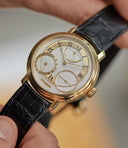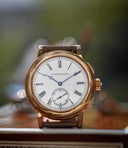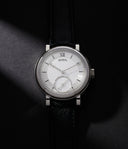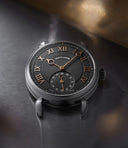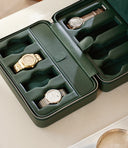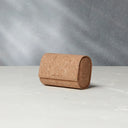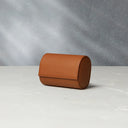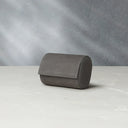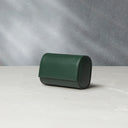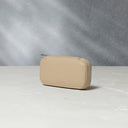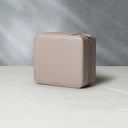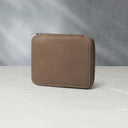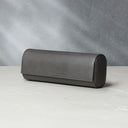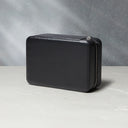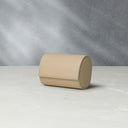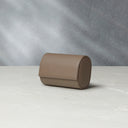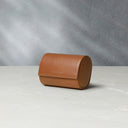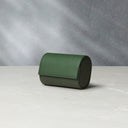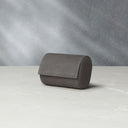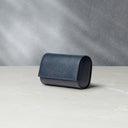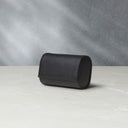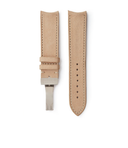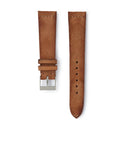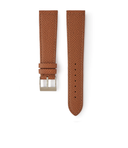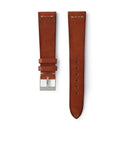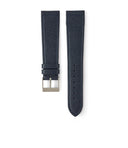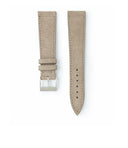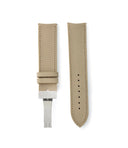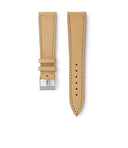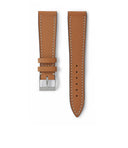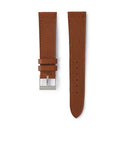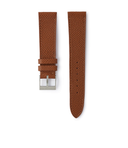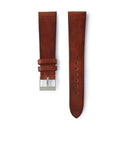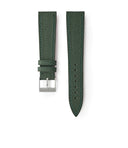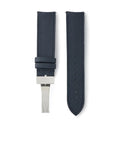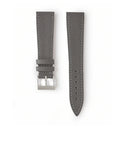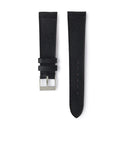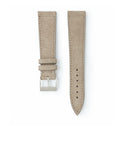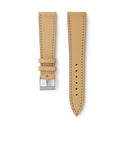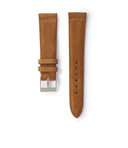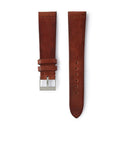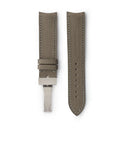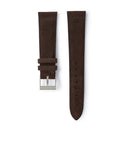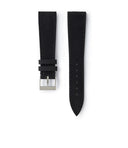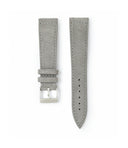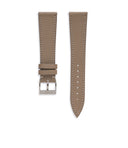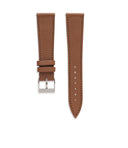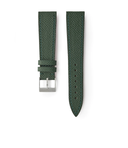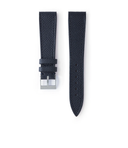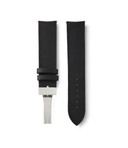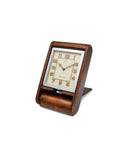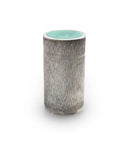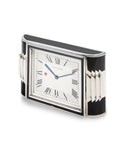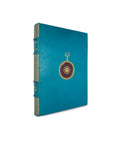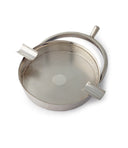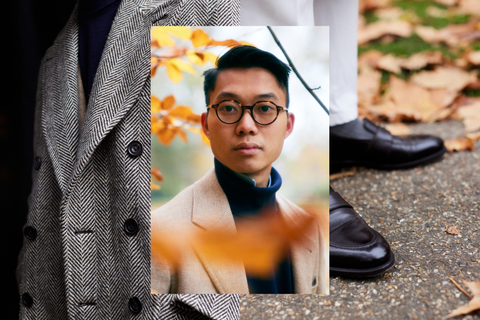
Interview: Oliver Spencer
By Josh Sims
One of the UK’s most respected menswear designers and retailers, Oliver Spencer designs clothes for the modern man. His eponymous casualwear label was founded in 2002, following the success of his formalwear company Favourbrook, and has reshaped our understanding of modern menswear for the past twenty years.
Since then, from reimagining formal attire in our popular consciousness through the inclusion of Favourbrook suits in the ‘90s-era romantic comedy Four Weddings and a Funeral, to getting to grips with what people need in a post-pandemic world, Spencer’s philosophy on timeless, well-made clothing continues to shine through.

Spencer in his studio.
We spoke with Spencer to get a sense of how his two very different brands represent his personality, as well as his take on the lifestyle business, individualism, and his style icons.
ACM: You went to art school and then had a clothing stall on London’s Portobello Road. How did you transition from that to launching Favourbrook, your first business?
OS: I just had this love of clothing in general, especially big old overcoats – what I call a grandpa coat, the kind in Withnail and I, coat as comfort blanket – and I worked out I could buy and sell second-hand clothing, but in particular coats. I could make a market for them. And that worked rather well. But then my dad introduced me to someone in Suffolk who was weaving a lot of silk and he showed me a room of damaged material - all of it ecclesiastical cloths - and asked me if I could do anything with them. I took them and thought, “I can make a waistcoat out of this,” got a pattern from a friend and that’s how I started Favourbrook.
That proved important in changing notions of what formal attire could be. Was that intentional?
The business nearly went bust but then Four Weddings and a Funeral came along and everything was wonderful. That was the power of film, and of media, back then. Suddenly everyone wanted to look like [the cast].

A whole spectrum of blue found at Spencer's eponymous brand, Oliver Spencer.
I had a sense that there was an opportunity for formalwear to break with tradition and be more fun – it was so stuffy and boring. I’d had people come into the shop and say they’d bought a scarf from Hermes and could I make a dress shirt and put it on the back? I told them, “Yes, but you’ll have a very sweaty back,” but they said they didn’t care. There was a desire to break rules, but in the best possible way.
I think history had got us very bogged down in the 1950s in terms of formalwear, in there being only one ‘correct’ way. Go back a century and men were dressing like peacocks. Then I started making a lot of moleskin and corduroy suits and someone once told me that I needed to set up a separate label because it wasn’t the same [design] language – and they were right. I’d like to say it’s all been plain sailing since then. But it has been a lot of fun and I still love it.
Do Favourbrook and Oliver Spencer, the brand, reflect two sides of you? Or are they for very different people?
I really see one as being me during the day and one being me if I want to dress up to go out at night. I wear all the stuff. It’s my life and I just hope other people want to be part of that. I don’t pay much attention to fashion. I’m more interested in lifestyle and substance. But above all, it’s got to be about having fun – and we’ve certainly lacked that for the last couple of years. It did seem like a massive leap to launch Oliver Spencer though and, without much money, it took about four years to get off the ground. But I was just cocksure of myself at that age – though, of course, it soaked up a lot of money and was difficult. I’m now an investor in three or four very different menswear businesses and I keep having to remind them that, contrary to expectations, they’re not going to get things done very quickly. It’s a seven-to-10-year process.


Spencer's two brands are two halves of an invitation to clients to share in his life.
Did you think twice about putting your own name on the label?
The other day I was chatting with a designer who’s about to set up his own label and he said he was thinking about calling it his own name. I said, “No, don’t do it! You’ll be saddled with the name for the rest of your life and it won’t be much fun.” You can walk away from something that doesn't have your name on it. I look at brands that have the designer’s name, but with which the designer is no longer involved, and wonder if they like being associated with all that their brand is now doing. I do regret it slightly. But that’s all hindsight.
Did you aim to fill a gap with Oliver Spencer as you had done with Favourbrook?
It’s odd, but back then menswear really wasn’t taken that seriously. I thought I’d just try to deliver some nice clothing – simple as that – and people really seemed to like that. It wasn’t taken seriously for the same reasons it’s not being taken seriously now after the pandemic – look at how the mainstream press has dropped the subject because it can’t see any revenue in it. But men are very loyal when it comes to clothing; it’s not a matter of endless marketing to them because they will know what they want and will come back to you regardless. I’ve just done this heavyweight white T-shirt and we sold out the entire stock in a few days. Why? Because it’s very apparent that nobody has offered such a thing – T-shirts are all flimsy little slips. Nobody thinks people are prepared to pay the money for this kind of very simple garment. But they are. There are all these little gaps in the market.
I look at brands that have the designer’s name, but with which the designer is no longer involved, and wonder if they like being associated with all that their brand is now doing.
Why is it that so many menswear brands don’t have a very good grip on what men actually want to wear?
I think often that’s ivory-tower syndrome, whereby the designer is somewhat held at a distance and divorced from knowing what customers want. And a lot of designers just don’t keep shop, so aren’t aware of what’s going on. So right now, for example, I think of my job as dressing men to get ready to go back to the office. Hopefully the moths have done their job and eaten all their clothing [during the pandemic] and they’ve got to get themselves some new gear. Essentially, men have left the suit behind and are finding a way of dressing that fits their kind of job. The pandemic has hugely changed the way the menswear industry operates – womenswear has gone ‘boom! Bash!’, everything is bigger and brighter, and menswear has gone a lot more inward, in a good way. There’s more care about what is being bought – it’s the considered purchase. That’s been happening over the longer term, but the pandemic has fast-forwarded a lot of trends.
Has that left Favourbrook struggling?
No, actually it’s been brilliant because now men are going, “Whoosh! I’m going out, so I’m going to put on my velvet jacket to go and get the fish and chips. I’m going to dress up to go to the boozer.” Weddings are going properly formal again, with morning suits for the ceremony and black tie for the evening. There’s a renewed love for dressing up because it lifts your spirit. I don’t see us just sitting around in tracksuits, especially for work. Business needs people to get back together to smell the coffee and listen to the chat in the tearoom. People need to learn skills and you do that best working right next to people, not isolated from them.
So what will drive our clothing purchases in this new environment?
I think there will be a much greater desire to express our individuality. That was always there to some extent; even in the suit brigade there was always the guy in the loud tie. Now people won’t be dressing to meet some uniform [requirements], but to express their personality a bit more in the workplace. That will be a challenge for some – and I’m here to help.
You’ve actually described your company as a lifestyle business that just happens to make clothes…
Yeah, our clothes aim to be adaptable for lots of different ways of living. What I want from clothing, and what I want to create, is clothing that people cherish, that they get upset about when it’s worn out. I’m disappointed when an item of clothing can’t be worn flat out for a couple of years – not least because I think it probably looks better then. Men definitely get an emotional connection to specific garments, to the feeling of the fabric, the way it moulds to you over time, and the fact that it’s easy on the mind. It doesn’t challenge you too much when you put it on. Men definitely have an emotional attachment to their trousers – seriously. They’re about the most particular clothing a man can own; how a man feels in his trousers will really help his mood and his confidence. And a lot of men are struggling with that because suddenly nobody is wearing jeans. Jeans are having a rest. They took over a bit too much.

From a sincere emotional connection to the spirit of dressing up, clothes are an indispensable part of our lives.
Were there specific design characteristics of Oliver Spencer, the brand, that you were always keen on?
Mega mega deliberate for me is that it’s not age-specific and it’s not covered in logos. I’m just at home selling to a 19 year old as a 90 year old. Fabrics are a massive part of being able to do that, and the age of the internet has allowed men to get much more clued up about those, as well as aspects of sustainability and factory conditions. We certainly do need to be much more clued up about what exactly we’re buying. Ten years ago, I don’t think a lot of men cared. They didn’t have a clue. But the education is there now.
One of the favourite things that’s ever happened was a grandfather coming in – he’d been a customer of ours for years – and he explained that he was fed up with his grandson nicking all of his shirts so he was going to buy him his own. And essentially I just don’t like logos. I don’t want someone else’s badge on my breast. Unfortunately I think many more men do like a logo. It’s like being part of a cult or a gang.
Men definitely have an emotional attachment to their trousers – seriously. They’re about the most particular clothing a man can own; how a man feels in his trousers will really help his mood and his confidence. And a lot of men are struggling with that because suddenly nobody is wearing jeans. Jeans are having a rest. They took over a bit too much
You’ve actually described yourself as a scruffy dresser. Do we place too much store in clothing and the messages it sends?
I think it’s all about character. We should all dress as our character is, and if that’s unkempt hair and a bit of a mess of a beard – as it is for me – then there’s no point in dressing in a completely different way. You should dress how you feel, as an individual. Look at that brilliant man, President Zelensky in Ukraine – OK, it’s wartime, but he’s not there in some shirt and tie. He’s rocking a green T-shirt most of the time. I think lockdown made us more accepting of that individualism in dress. It’s about feeling comfortable. Not all of us were born to look like some dandyish figure. I’d describe myself not as fashionable but as stylish, but, my god, it’s a work in progress. I’m getting there, though.


Quirky details found within the Oliver Spencer boutique.
Do you have style icons?
I’ve always liked the way James Dean looked - he wore an overcoat well, and a white T-shirt well. But then I like the refinement of David Niven, and Omar Sharif. And more recently I’ve loved the wardrobe of Peaky Blinders. Not long ago I went to Naples and the whole town is stylish. Not necessarily the men in particular, but the whole lifestyle. There are so many cultural points that affect our style these days.
What do you think men are still afraid to wear?
We haven’t got our heads around skirts, have we? We’ve had a couple of goes. I don’t see any reason why we shouldn’t wear skirts. Wide-legged trousers – we haven’t quite worked those out, but they will come back. And no man should wear a shiny suit, but that’s because I don’t like them and that’s particular to me. We have got much more comfortable about wearing colour, though – that’s the result of a long process of being exposed to it.

There are an incredible number of cultural points that affect how we style ourselves.
It’s been 20 years since Oliver Spencer was founded. What’s been the highlight of that time?
It always comes back to the people – meeting the customers. That’s why I’m so keen for shops to survive. The number one thing about shops is that they’re one of the cores of the community and that’s my big thing. The art of being a shopkeeper is a dying one, because it’s about conversation. When you go to your local butcher, baker or whatever, you express a view, whether that be about the cricket or politics. Lose shops, and you lose that conversation which I think is central to the fabric of community. The internet is taking over – but I’m into shops for the long run. That’s why I re-signed all of my shop leases after the pandemic.
Do you think that’s becoming an outdated view?
A lot of things have to change – fast fashion, for example, is a terrible, terrible thing. The six-monthly fashion calendar should be a thing of the past. We should design for the season, as chefs cook for the season. But when I design a collection, I always say that I have one leg in the past and the rest of my body in the future – and old-fashioned values still hold a lot of sway.


While online shopping may have changed how we consume clothing, shops will continue to be central to the fabric of community.
And you have three teenage sons to bring up with those values, too.
Yeah, the older son isn’t that into clothing, really. He likes very utilitarian stuff. He’s a rugby No.8 so everything has to stand up to rough and tumble, and there’s a lesson in that for a designer, for sure. My middle son is much more fashion conscious. And the youngest is quite sartorial. I gave him one of our puffa jackets for Christmas – most kids would bloody well love that, but if your parent is in the industry the reaction is, “Oh, not more clothes.” I think they’re not into clothes because I am. Whatever Dad likes, we don’t like. Sometimes I wonder, “What do you mean, you don’t like it? C’mon!”
Our thanks to Oliver Spencer for taking the time to speak with us. Photography by Ollie Grove.
























































































